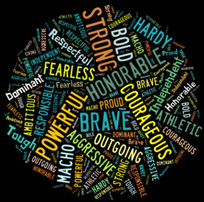 Many men report that they feel alienated, alone, remote from the world, disconnected from their families and the community at large. They simply feel lost, and are seeking new images of masculinity that can support them in a return to feeling, aliveness, and a connection to nature, our bodies, our children, women, and other men. Some men turn to women for solutions, but often this creates different sort of problems such as codependency, and isolation from other men. Most movies and TV shows portray men as heroes and thus many men identify with image of the hero. Consequently most of us (men) have attempted to live our life as some type of masculine hero. It has also been ingrained in men that they need to be heroes in order to gain intimacy with women. There is of course the allure of power and invulnerability in adopting the image of the hero, but there is also a heavy price to pay: alienation, isolation, stress induced physical or mental illness, injury and even death may be possible outcomes. Many men become codependent – that is habitually taking care of others at their own expense just to be a hero in order to seek acceptance and affection. As a result many men become workaholic, numb, and addicted to excitement in order to compensate for numbness, addicted to substances and sex, and finally they may lose their soul. Let us define the soul as the mysterious quality that animates dead matter and makes it alive – and connects us to mother earth. Many men feel disconnected from an authentic spiritual source of aliveness (connection to mother earth). Having lost our souls we become at best unhealthy and at worst highly destructive to the lives of men, women, and everyone around us. Many men do not feel the loss of their souls until they find themselves in a hospital after a heart attack. From a very early age boys are taught to be “tough and rough”. Boys are weaned earlier than girls. Boys are touched less than girls (by significant caretakers). Boys are more likely to be held facing outward toward the world and others. Girls are held inward, toward security, warmth, and comfort of the parent. Boys are taught that feelings are not masculine. Boys are taught that they must forego pleasure and endure pain to be a man. Men are taught that they should suffer alone and in silence – hence they cannot become vulnerable in presence of women. Boys are forced into contact competition (various contact sports). Biology has not been very kind to boys and men either! Boys tend to lag four to six months behind girls in their development. Boys crawl, sit, and speak later and tend to cry more during infancy. Nature makes more genetic errors in the makeup of boys resulting in more birth defects (absence of redundancy – YY vs XY Chromosomes). Boys are more prone to schizophrenia, mental retardations, autism, hemophilia, muscular dystrophy, stuttering, other speech disabilities, dyslexia, etc. All and all, there are about two hundred genetic diseases that affect only boys. Men perform much more hazardous jobs compared to women. More than 100K veterans of Vietnam war committed suicide (twice the number that died in battle). Wars may finally end when society begins to hold the security and lives of young men to be as sacred as those of women. The highest mortality rates in US are found among timber cutters (90% male), power line workers, insulation workers, garbage collectors, and miners (85% men), and farmers (79% men). Until recently 90% of peptic ulcers were found among men, as well as significantly higher rates of heart disease. Men's life expectancy is 8 years less than women (but this is changing!). Women enter psychotherapy and visit physicians more often. Men are twice as likely to commit suicide or have serious mental and emotional problems following divorce compared to women. Society also accepts violence perpetrated against men as men are primary objects of violence in our culture. Men comprise 80% of homicide victims, 70% of robberies, and with exception of rape they comprise 70% of all aggravated assaults. Violence against men is a form of entertainment. Boxing, football, hockey, and car racing are examples. In the Vietnam war, men were killed 8K to one over women. In films and television, more than 90% of the characters who die are men. Boys are encouraged to compete for the purpose of winning, while competition in primitive societies was for enhancing skills and not winning. Absence of Fathers – Fathers have been exiled in the post industrial age. During the pre-industrial age boys worked with their father on the land and identified with them. In our post-industrial age when fathers have to leave home to work in factories or offices, boys are left with their mothers and consequently identify with their mothers. This identification results either in formation of a hypo-masculine (effeminized) man or the hyper-masculine (hero) man. As more boys are brought up by women, fear of women and male passivity seem to be growing, possibly resulting in violent acting out. In absence of their fathers, and in search of male identity boys may join violent gangs. Boys fill the absence of father by becoming mother's little man, someone she could lean on, confide in, even flirt with in some cases. The boy becomes the codependent son, metaphorically mother's lover and ultimately her victim. The boy identifies with mother, and sees his masculinity in terms of differences between his sexual organ and that of her mother, and not the similarity between his sexual organ and that of his father. Boy then needs to prove his “manhood” by engaging in, at times, indiscriminate sexual acts. He needs to have sex to feel he is a “man”. His sexual activities are disconnected from his heart feelings. He does not know how to relate to women in mature ways. Urbanization has also disconnected many men from their more traditional “earthy” masculinity, aggravated by the absence of father in the post-industrial age. Industrial society damages men and causes the “psychological depletion of men in urban settings … While urbanization appears to sponsor male passivity, it has the opposite effect in regard to women and spurs their liberation.” (David Gutmann) Men have been encouraged to repress their anger or transform it without expression, while feminist movement has encouraged women to express their anger. Repressed anger, when finally emerged, can be expressed violently or in self destructive ways. We must own our anger embrace it with respect, as men's anger has a very healthy component. When we see oppression and injustice anger is justified. When we see environment being destroyed by greed or ignorance, anger is justified. When we see violence perpetrated against women, other men, and children, anger is justified. Without proper expression of anger joy is not possible. When we do not own (contain) a feeling, we will either repress it or act it out. Similarly, when men do not own/embrace their masculinity, they become either hyper-masculine (hero image – acting out), or they become hypo-masculine (repression). The heroic male in quest of strength cut away his softness, with it, he also lost sensitivity – Life was diminished and feelings became less rich. The soft male, in cutting away his hardness, lost his fierceness, his capacity for committed action and success in the world. Men must individuate and become their true selves which may not conform to any societal value. Unless a man is in contact with his own essence – his masculine soul is incomplete. He can become like a vampire, sucking energy out of women because he does not have the ability to nourish himself from his inexhaustible depths. To the extent that we lack a solid connection to a depth of soul within, we seek it outside. When we believe we cannot be loved for who we are, we try to be a hero to save and rescue “her” and therefore gain her love and affection. Reconnection to our depths requires non-heroic attitudes: surrender, sensitivity, humility, and a willingness to leap into the unknown. Men in their old days – Elder (wise) men are precious assets to our society. An elder man who is connected to his depth is a man of inestimable value. He can temper the aggression of younger men. He knows that the wounds of war never compensate for its glory. He knows that the gleam of marketplace cannot compare with the beauty of nature's wonderful fabric of life. He is a peacemaker. An elder (unwise) man who is still caught in hero image, may long to reclaim glories through the actions of younger men. These are old men who are quick to send young men to war. These are old men who devour non-renewable resource of our planet with no thought for future generations. Men are not merely seeking the lost father in their lives. They are hungering for soulful elders. The elder can plant the seed of soul in a young man. He is closer to death, closer to the mystery, and further from the illusions of youthful endeavor and heroic visions. He can become soul-father to younger men. We are hungry for a connection to elder men, so we now seek them out. We also seek connection to the elder within – a guide and counselor in our lives. Resources: The Knight with rusty armor (Robert Fisher) Knights without armor - A guide to inner lives of men (Aaron Kipnis) Fire in the belly - On being a man (Sam Keen) Comments are closed.
|
AuthorHomayoun Shahri Archives
May 2016
Categories
All
|
Ravonkavi Privacy Policy
©2018 Ravonkavi
©2018 Ravonkavi

 RSS Feed
RSS Feed